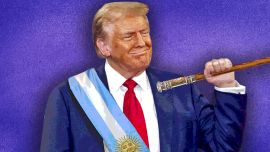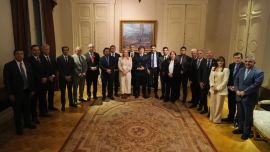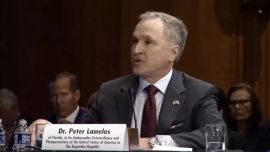International media outlets The Economist, Financial Times and The Wall Street Journal are now praising Javier Milei’s economic plan with the same conviction with which they criticised it the week before the elections. The first is a cooperative of British journalists, the second was purchased by Tokyo’s main business daily Nikkei and the third is Rupert Murdoch, the owner of Fox News, demonstrating the eclecticism and instability which also affects the best international business journalism, revealing that the need to empathise with what they suppose is the mood of their audiences – identification with success in this case – is not just a recently exacerbated characteristic of our country’s media. While in the week before the elections they were analysing the possibility of an early end for the Milei government, they are now taking his re-election for granted.
If in 1983 the engineer and economist Marcelo Diamand wrote the book El péndulo argentino: ¿Hasta cuándo? (repeatedly quoted for being eternally topical), in 2025 we might say that what has changed is the speed for that pendulum, from years to months and now days. The acceleration of something is not a symptom of change but quite the contrary. Perhaps, hopefully, the threshold of true change – which would be, as former Perfil editor Walter Curia wrote in a column: ’El verdadero cambio sería si Milei hablara con Kicillof’ (“The true change would be if Milei spoke to Kicillof”), if, independently of those two persons, achieved in 2027 between representatives of different thinking.
It is not that for Buenos Aires Province Governor Axel Kicillof “one plus one is not two,” as maintained by the President, but that it suits the latter to confront the monstrous ghost of Kirchnerism, which has paid him such good electoral dividends. As we have been arguing, if Kirchnerism triggers that fear in the leading minority of society, that would be the responsibility of Kirchnerism, whether or not that fear is justified.
Returning to Milei and the co-author of the plan, Economy Minister Luis Caputo, to revert to the phrase about Cristina Fernández de Kirchner adapted to the present: “Without [United States Treasury Secretary Scott] Bessent it’s impossible, with Bessent it’s not enough,” because the structural problems of the economic plan, which are not just financial, continue. Even if the contribution of the US Treasury solves the problem of dollar debt and country risk sinks to levels permitting a return to voluntary markets and banishing any risk of default, the “trickledown” of concrete economic benefits solving the financial problems of most voters has yet to be resolved with the possible arrival of a massive volume of investments and the possible passage of labour law, tax and pension reforms.
What the Milei government received from the ballot-boxes was, more precisely, “a respite,” a refinancing (never more literally fitting the metaphor) of its social credit, now fully empowered, and now it only remains to begin repaying to the citizenry that confidence deposited in instalments throughout 2026. Sebastián Plut, coordinator of the psychoanalysis and politics research group of the Asociación Escuela Argentina de Psicoterapia para Graduados, put it very well in his book El autoerotismo libertario: “Autoeroticism is a Freudian concept referring to the moment in the psychic formation when the baby is hungry, sucks its thumb and thus thinks that they are eating. The baby stays hungry afterwards, of course, since neither a thumb nor a dummy are enough, so they cry. Autoeroticism permits the study of those moments in which the incredible is believed, both in the psychic and the psychopathologic constitution. The point is how much time one can continue believing the incredible and what happens when you can no longer keep believing.”
If Kirchnerite corruption was tolerated because it distributed and Milei and Carlos Menem because they lowered inflation, the question would be how much incompetence would need to be shown to suffice if wealth is not distributed. As Manuel Adorni said with his usual assertive petulance when still presidential spokesperson: “Ending that famous fraud of redistributing nothing, which was nothing more or less than distributing or multiplying misery.” Ending the fraud would be to distribute true wealth, which first implies the challenge of creating it and then be capable of distributing it sustainably without affecting the process of creating the new wealth.
With the disappearance of the so-called “riesgo kuka” (“Kirchnerism risk”), Milei cannot continue blaming the problems on others and if, in the future the riesgo kuka reappears, its revival will be his responsibility, as it was for Mauricio Macri in 2019 after having won in 2015 and 2017.
Economics is always potential and the favourable result a fortnight ago makes it more possible for Milei’s promises to come to pass. But his specialty has ceased to be continually modifying the economic objectives in the face of issues created by the opposition which produced suboptimal results and has started to be fulfilling his own objectives.
The latter will no longer be lowering inflation – now growth will be asked of him followed by development boosting the competitive vectors: natural resources and cheap skilled labour.
Two abysses
Defeats are opportunities to know and learn more. Success reinforces what we already know. And the last two months have seen two monumental triumphs but also two monumental defeats. Peronism celebrated in September and wept in October. La Libertad Avanza wept in September and celebrated in October.
Although he who laughs last laughs best, both of them wept – a lot. And fundamentally both of them also stared into the abyss, something not easily forgotten. The exit of Cabinet chief Guillermo Francos, no less, cannot be a symptom of triumph for any government.
Without Donald Trump’s intervention, the government would have collapsed. With Trump’s intervention and even without splitting the elections, the Peronism of Greater Buenos Aires would have collapsed. Perhaps it was the best thing which could have happened to the country. Adam Smith transferred this to the economy: “Recessions are inevitable because successful human beings tend to take a break.”
Novelties appear in failures. Politically everything remains to be done because Milei was resuscitated by nothing, that nothing being the demand for a political supply still not satisfied by the opposition while voter desertion amounts to that supply not being satisfied by the government.
“In September the people took their revenge on Milei and in October they did not want to give Peronism a chance,” said Andrei Roman, founder of Atlas Intel, the consultancy firm which most often gets electoral results right.
Both Milei’s victory last month and Kicillof’s in September were aggrandised by the difference with expectations with one the mirror image of the other. First it was expected that the national government would win and it was the other way around and then the opposition was expected to win and also the other way around. In their wisdom, Argentine voters found a way (Hegel’s “astuteness of reason”) to show both poles of the ‘grieta’ chasm a yellow card.
Society voted no twice. No to the future being offered by Milei (September) and no to the past offered by Peronism (October). Dissatisfaction with everybody. In not opting for the alternatives to polarisation, the voters gave an extra life to the government and Peronism. A respite.
For Peronism, it’s complicated – younger voters prefer Milei while the poorer are not so Peronist, the two groups with the highest numerical growth in Argentina. For Milei, it’s complicated – he could only beat Peronism by a handful of percentage points at its worst moment in its history. While Milei wins his elections, his popularity wanes month by month. Neither fact is contradictory, they bespeak the weakness of his rival.
Peronism is seen as a bearer of chaos at national level. And it seems that society chose, as in vaccines, that the antidote be a partial dose of the poison: chaos x chaos = order.
“Tabula rasa” is a concept popularised by the English philosopher John Locke for the metaphysical debate over the origin of the origin but its use is more related to its etymology as a clean slate as with the birth of a baby – a blank brain for its format to be set. Also when facing a demolition where nothing remains standing with sufficient solidity to sustain a structure.
If we add up the votes of LLA/PRO to Fuerza Patria, little more than two-thirds and multiply them by the also around two-thirds who turned out to vote, almost half the electorate chose not to express themselves on either side of the polarisation.
The economic results obtained by Javier Milei in the second half of his term will be written on a tabula rasa. It is time that La Libertad Avanza demonstrated its capacity really to create wealth and distribute it without affecting the creation of new wealth to enter into that virtuous circle making it sustainable with that growth passing to development.
In a recent interview, that inescapable spokesman for heterodox Latin American economic thinking, Roberto Frenkel, ran over the contemporary global economy and its motors of development and is highly critical of Caputo’s economic plan (and of Trump’s in his country) when concluding: “This economic model is finished. The United States cannot be financing us permanently.”
He forecasts a greater price for the dollar, higher inflation and a longer postponement of growth. Yet he does not believe that this alone will create the opportunity for a Peronist comeback, which will depend on the definitive construction of new economic songs which sound plausible to a society mistrusting Peronism as an administrator of the national currency.























Comments